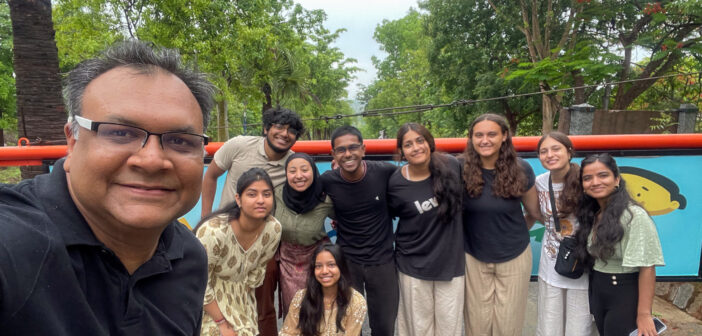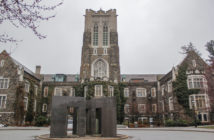Khanjan Mehta and his student team wake up surrounded by the beige cement walls of the Makambo Village Hotel in Sierra Leone. The air is sticky, and the late July sun is already blazing.
They leave their hotel rooms, grab their supplies and head to the common room for breakfast. The day’s menu is the same as the previous day, and the day before: an egg, fresh-baked bread and some plantains.
The car pulls up, and the group and their translators pack in. When they arrive at the village, they head door-to-door to conduct today’s rounds of interviews in the hopes of perfecting the function of ukweli test strips. These strips could revolutionize the maternal health of not only those in Sierra Leone but millions of women in Africa.
The Innovations in Maternal Health and Cervical Cancer Prevention project is just one of the Global Social Impact Fellowship projects spearheaded by students under Mehta’s Creative Inquiry program. Mehta was hired as the Vice Provost of Creative Inquiry in 2016 and has been providing students with opportunities to participate in hands-on research projects around the world through the fellowship ever since. Through the program, Mehta takes students to Sierra Leone, Kazakhstan and the Philippines every summer.
Mehta now travels to a new country almost every school break, though he didn’t start traveling regularly until he reached his 20s.
Despite growing up in the middle class in India, his family never had the money to travel abroad.
While studying for his graduate degree in electrical engineering at Penn State University, Mehta saved every penny so he could afford to travel to Europe after graduation.
“I would walk an hour and a half in the snow to save a dollar instead of taking the bus,” Mehta said. “I would walk everywhere I could because I really wanted to travel.”
Once Mehta finally saved enough money, he spent two and a half months adventuring across Europe by himself, which furthered his passion for travel.
He wanted to experience the world.
“If you do not travel, you are just seeing a small slice of what the world and humanity has to offer,” Mehta said.
Mehta has traveled to over 85 countries, and he has trouble identifying which of his adventures has been his favorite so far. He said every country and culture has its own charm, and he has encountered wonderful people everywhere.
Noah Weaver, ’23, who traveled alongside Mehta to Sierra Leone four times while at Lehigh, remembers Metha being intimidating at first because of how he talks about social issues from such a broad perspective.
But, after working with him for the past three summers, Weaver said Mehta is a strong form of inspiration for everyone in the program.
“His role is not just to be a faculty advisor,” Weaver said. “He takes on more of the role of someone that is going to challenge you, but also work side by side, elbow to elbow with you.”
Before coming to Lehigh, Mehta mentored a student club at Penn State called Engineers for a Sustainable World. Mehta used money out of his own pocket to travel to Kenya and build windmills with the club.
While he was there, he realized focusing on technology wasn’t going to work to get things done. Instead, he learned he needed to understand the culture and economy and how to create value for people, and he established the Humanitarian Engineering and Social Entrepreneurship Program at Penn State.
When Mehta came to Lehigh, he wanted to continue building programs focused on social impact because he wanted students to engage with other cultures, not only to learn but also to allow them to travel.
Working with Lehigh students in particular is important, Mehta said, because they are hungry to learn, passionate and they want to change the world.
“It would be a mistake if we don’t engage with the world and learn how to work with others to solve problems that matter,” Mehta said.
While traveling, Mehta has unleashed numerous new passions, including adventure, sports and cooking.
“I have done all kinds of things from bungee jumping to rafting on the Nile,” Mehta said. “I am a thrill seeker. I am always excited to experience the next thrill.”
Mehta loves the creativity cooking gives him. With his busy schedule, he said cooking has served as a form of mindfulness and meditation for him. He especially enjoys cooking for large groups of people. He even used to take over the cooking when he traveled with students to Kenya at Penn State.
“We would make it a good bonding opportunity,” Mehta said. “I would have 40 students that would help me cook all kinds of gourmet meals that we could find locally in Kenya. There is a lot you can learn from (cooking), like how to cater to different tastes and create something truly fun and remarkable out of what’s available locally.”
Over nine years of work in Sierra Leone, Mehta has fostered an array of relationships with people from universities, government institutions and other groups.
One of these relationships is with the National Director of Nutrition in Sierra Leone. Mehta said Aminata Shamit Koroma requested for Mehta and his students to be the ones to work on shelf-stable locally manufactured food products that can deliver micronutrients to children.
In the field, Mehta describes himself as “the chief troublemaker,” and said his job is to help students learn how to build relationships and work well with others.
Sandrine Haab ‘23 said while she did not spend too much time with Mehta in Sierra Leone, she remembers she didn’t see him smile often, but when she did it was a special moment.
“My group and I had gone to this one clinic (in Sierra Leone) to interview some nurses, and I saw (Mehta) playing with one of the young children as if it was one of his own daughters,” Haab said. “It was the most adorable thing I ever saw.”
Mehta said he continues to bring students to countries across the world every summer because he’s a believer in the Ubuntu philosophy of “I am because we are.”
He said he wants students to learn how to work with others and how to engage with others in a reciprocal, ethical and harmonious fashion.
“We don’t impose our solutions on others,” Mehata said. “We don’t let others impose their solutions on us. But you work together, shoulder to shoulder, to co-create solutions. That’s what I want students to learn how to do.”






Comment policy
Comments posted to The Brown and White website are reviewed by a moderator before being approved. Incendiary speech or harassing language, including comments targeted at individuals, may be deemed unacceptable and not published. Spam and other soliciting will also be declined.
The Brown and White also reserves the right to not publish entirely anonymous comments.